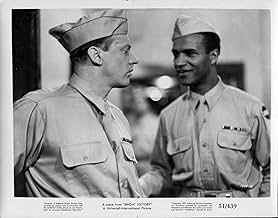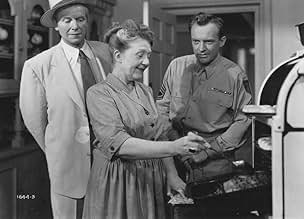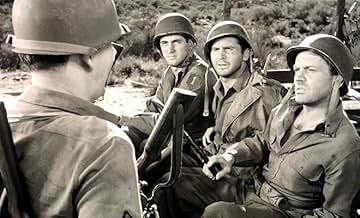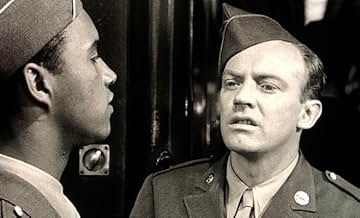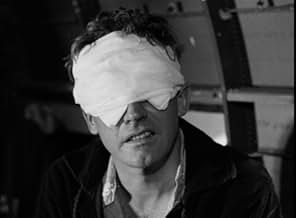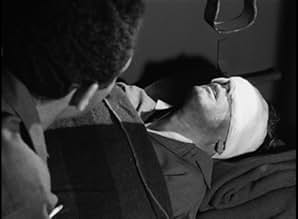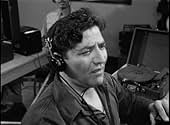IMDb RATING
7.3/10
1.1K
YOUR RATING
After he gets blinded by a German sniper's bullet in 1943, Sergeant Larry Nevins begins the long and painful road to recovery.After he gets blinded by a German sniper's bullet in 1943, Sergeant Larry Nevins begins the long and painful road to recovery.After he gets blinded by a German sniper's bullet in 1943, Sergeant Larry Nevins begins the long and painful road to recovery.
- Nominated for 2 Oscars
- 5 wins & 6 nominations total
Julie Adams
- Chris Paterson
- (as Julia Adams)
- Director
- Writers
- All cast & crew
- Production, box office & more at IMDbPro
Featured reviews
I stumbled upon this excellent and compelling film during AMC's "Veterans' Day Movie Marathon." Dealing with a soldier's (Arthur Kennedy) rehabilitation after losing his sight during WWII in surprisingly frank ways for its time (released in 1951), this seems to me to be the first time I saw raw racism and its consequences in a film. A superb love story on the surface, it's the underlying themes of classism, racism and realistically dealing with the handicapped which set it a notch above the terrific 1946 film, "The Best Years of our Lives." Face it, Harold Russell, while a hero, was no actor. The electricity between Kennedy and his new "friend" (played by Peggy Dow ~ whatever became of this talented actress? Her career lasted only 4 years) is remarkable. Happy ending doesn't detract.
Poignant account of blinded war veteran adjusting to civilian life. Though the premise has built-in emotional appeal, that fine actor Arthur Kennedy prevents the tale from becoming too sappy or even sentimental. Understandably, there were a number of these "adjustment" movies made after WWII, The Best Years Of Our Lives (1946), and The Men (1950), to name two. More than the others, I think, BV follows one man's (Kennedy) difficulties in re- integrating with family, love life, and community. Naturally, films of this type sought to be uplifting and optimistic in dealing with a devastating post-war problem. BV is no exception. Then too, the racial subtext is well-handled, bringing to the surface those inner qualities that are often overridden by outer appearance. In that sense, Larry's (Kennedy) perception is ironically sharpened by blindness once he figures out the lesson.
The movie's well-made, using actual locations such as city sidewalks, VA hospitals, and train stations, all of which provide a realistic feel. Then too, what guy wouldn't like being helped along by the likes of Judy (Dow) who resembles June Allyson's sexy older sister. Too bad, her accomplished career was so short. Just as regrettable is the amazing James Edwards, one of the first Blacks to get dignified roles. Seems his pioneering career was over-shadowed by the equally charismatic Sydney Poitier.
All in all, the movie surpasses its time because of the common humanity that appeals beneath one man's courageous struggle.
The movie's well-made, using actual locations such as city sidewalks, VA hospitals, and train stations, all of which provide a realistic feel. Then too, what guy wouldn't like being helped along by the likes of Judy (Dow) who resembles June Allyson's sexy older sister. Too bad, her accomplished career was so short. Just as regrettable is the amazing James Edwards, one of the first Blacks to get dignified roles. Seems his pioneering career was over-shadowed by the equally charismatic Sydney Poitier.
All in all, the movie surpasses its time because of the common humanity that appeals beneath one man's courageous struggle.
Reminds me more of Pride of the Marines than Best Years of Their Lives. Blinded returning vet has to readjust. Arthur Kennedy never was better than in this movie. The ending in this cynical age seems too upbeat, but such endings DID happen. See: The Men with Brando for another crippled returning vet film.
Of course I always loved Bright Victory, since my dad was one of the blinded veterans used as extras in the movie. I remember him telling me that Kennedy had dark contacts in, and would yell out to remove them as soon as a scene was over.My dad said he felt like calling out, "But I can't remove mine!" It is a wonderful story of many blinded vets, particularly at that time. A captain was accompanying my dad and another blind soldier, who happened to be black, to their homes in GA. When they came to the train station in DC, they were informed that the black man could no longer ride in the same car. Both the captain and my dad were outraged for this soldier who had also gave his sight for his country. A new car was added to the train, and the 3 soldiers had it all to themselves. I was proud of my dad and the captain for taking that stand. They are deceased, but the lesson of the train, and the lesson of "Bright Victory" are both stories I pass on to my child and to my students over 32 years.
"Bright Victory" came as a total surprise. The film is not seen as much as it should, because of its positive message. Mark Robson directed with an eye to detail. "Bright Victory" was adapted by Robert Bruckner and has a pleasant music score by Frank Skinner.
In spite of taking place during WWII, the movie seems timeless right now because of the Iraqi conflict. We are shown an Army hospital where the young soldiers are seen rehabilitating and learning new skills for their permanent disabilities. The wounded men we see in the Army facility at Valley Forge, Pa., are being treated because of their blindness as a result of wounds received in combat.
For a 1951 film, "Bright Victory", was light years ahead since the young G.I.s we see in the hospital have to come to terms with the fact they will not be able to see again in their lives. It's a credit to its director and screen writer to present this new reality the soldiers are going through with compassion and dignity.
A great performance from Arthur Kennedy, one of the best actors of that era, makes this movie appealing. Peggy Dow, as the compassionate young woman who volunteers in entertaining the wounded soldiers, is a welcome presence in the film. Mr. Kennedy and Ms. Dow made the film even better because their no nonsense approach to the portrayal of these two souls that find one another in the worst possible circumstances.
The movie also presents in smaller roles actors that went to have careers of their own. Will Geer, James Edwards, Jim Backus, Richard Egan, Murray Hamilton, Rock Hudson, and Jerry Paris play as part of the ensemble cast gathered for "Bright Victory".
This film is worth seeing because it shows us how some people overcome a terrible fate in a way we never thought possible.
In spite of taking place during WWII, the movie seems timeless right now because of the Iraqi conflict. We are shown an Army hospital where the young soldiers are seen rehabilitating and learning new skills for their permanent disabilities. The wounded men we see in the Army facility at Valley Forge, Pa., are being treated because of their blindness as a result of wounds received in combat.
For a 1951 film, "Bright Victory", was light years ahead since the young G.I.s we see in the hospital have to come to terms with the fact they will not be able to see again in their lives. It's a credit to its director and screen writer to present this new reality the soldiers are going through with compassion and dignity.
A great performance from Arthur Kennedy, one of the best actors of that era, makes this movie appealing. Peggy Dow, as the compassionate young woman who volunteers in entertaining the wounded soldiers, is a welcome presence in the film. Mr. Kennedy and Ms. Dow made the film even better because their no nonsense approach to the portrayal of these two souls that find one another in the worst possible circumstances.
The movie also presents in smaller roles actors that went to have careers of their own. Will Geer, James Edwards, Jim Backus, Richard Egan, Murray Hamilton, Rock Hudson, and Jerry Paris play as part of the ensemble cast gathered for "Bright Victory".
This film is worth seeing because it shows us how some people overcome a terrible fate in a way we never thought possible.
Did you know
- TriviaTen blind WWII veterans at the hospital appeared as extras and were advisers for this film.
- GoofsThe locomotive pulling the train when Joe arrives home in Florida was not produced by American Locomotive Company until 1950, seven years after the actual event. Diesel locomotives were not used on local trains until after the war years.
- Quotes
Larry Nevins: I told ya i wanted security, remember... well I was looking for it in all the wrong places. Nobody can ever give it to you Judy. That way, it costs too much, you gotta make it for yourself.
- How long is Bright Victory?Powered by Alexa
Details
- Runtime
- 1h 37m(97 min)
- Color
- Aspect ratio
- 1.37 : 1
Contribute to this page
Suggest an edit or add missing content

